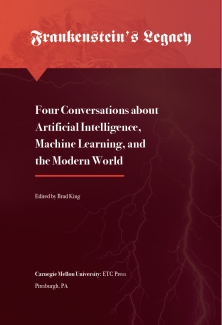Frankenstein’s Legacy
This collection brings together CMU scholars in the Arts, Humanities, and Sciences to consider the relevance of Mary Shelley’s novel today, particularly how it helps frame the responsibility of investigators to consider the consequences of artificial intelligence and a technologically-augmented human society.

Mary Shelley’s novel Frankenstein or, The Modern Prometheus was first published two hundred years ago on March 11, 1818. Shelley’s novel warns of the possible sacrifices for knowledge and hints toward the costs to man and society, how new knowledge can redefine human existence and experience.
These themes of Frankenstein have been reinterpreted and applied to debates regarding atomic weapons, nuclear energy, cloning, bioengineering, robotics, and artificial intelligence (AI). This collection brings together CMU scholars in the Arts, Humanities, and Sciences to consider the relevance of Shelley’s novel today, particularly how it helps frame the responsibility of investigators to consider the consequences of artificial intelligence and a technologically-augmented human society.
